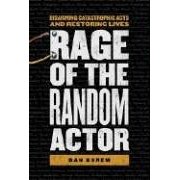Edited 2003 review to add links and respond to comment.
I normally rave over Ralph Peter's books. He is America's Lawrence of Arabia and a brilliant intelligence analyst, especially on non-conventional threats. In this book (actually, a collection of clippings, most from the New York Post, which says something right off), he goes a bridge too far–on the one hand, he and his mentor, General McCaffrey) go several bridges too far in their praise for the “courageous” strategy of the Bush Administration (it's not a strategy, it's a mindless vendetta bought and paid for by Zionists), and on the other, he applies his superb mind to the realities of our global conflict with radicalized Islam.
The book is full of gems. I've said he is a soldier-poet before, and this book continues that tradition. The flashes of brilliance demand the purchase and reading of this book.
His most important point, one that merits its own book, is that America has misplaced its priorities in attacking radical Islam through Iraq (and passivity toward Saudi Arabia's sponsorship of terrorism, a neglect that will cost vastly more than the Iraq misadventure), and that it is the Muslim “outlands” from Central Asia to Indonesia, the Philippines, Malaysia, and India (with the second largest Muslim population in the world after Indonesia) where America would be elevating women, nurturing secular states, and spreading the gospel of peace and prosperity.
The author takes the long-view, at least a 50-year view, and this is in sharp contrast to the “quick win at any cost (to the future)” of the current Administration. Indeed, when the author describes bin Laden as “ultimately a blasphemer against his own religion, having appointed himself God's instrument upon earth, assuming the license to kill by the tens or tens of thousands those who do not share his vision, to purge, to punish, to sanctify,” the author is in fact describing George W. Bush, not just bin Laden.
The author overcomes the limitation of New York Post hyperbole in many of his pieces. Among the most interesting is one on the five socio-psychological pools from which terrorists draw their membership: underclass, “course of conflict” joiners, opportunists, hardcore believers, and mercenaries. Also helpful is his coverage of monotheist cultures, including a subtle reference to neo-conservatism aligned with Zionism as a rising monotheist culture potentially capable of undermining American democracy and religious tolerance.
Deep in the middle of the book we find his discussion of a world divided into three strategic zones, apart from North America: the monotheist zone centered in the eastern Mediterranean; the Sino-Verdic(Indian) zone; and the postcolonial zone of Africa and Latin America. His discussion cannot be summarized and contains many brilliant insights, including a conclusion that China is not a regional threat, and China's greatest variable is not its external ambition but rather its potential for internal implosion. He is provocative in envisioning a huge “Afro-Latino-American” triangle of power emerging, with Brazil, South Africa, and the USA as the potential engines for this renaissance of the Southern Hemisphere.
The author joins Robert Baer, whose book Sleeping with the Devil: How Washington Sold Our Soul for Saudi Crude in calling for a complete withdrawal of US support for the despotic and sleazy Saudi regime that blatantly continues to support global terrorism and the radicalization of Muslim youth.
Where Ralph Peters falls short, I believe, and I say this with the utmost respect for this warrior-scholar who has placed his life on the line more than once, is in allowing his ultra-patriotism to shut out the discordant and sometimes dissenting view of other patriots who are perhaps more willing than he to acknowledge that we ourselves are part of the problem. This book is a one-man opinion piece with no reference to other works, such as those by Jonathan Schell The Unconquerable World: Power, Nonviolence, and the Will of the People, Mark Hertsgaard The Eagle's Shadow: Why America Fascinates and Infuriates the World, or Michael Hirsh At War with Ourselves: Why America Is Squandering Its Chance to Build a Better World, among the many other national security books I have reviewed here at Amazon. It falls prey, therefore, to the over-powering tuba effect, and loses some of its gloss in being so strident and so unabashedly “grind the bastards down, we are the light”–but then, we acknowledge that he was writing originally for the New York Post.
The author gets some big things right: Bill Clinton, Madeline Albright, and Sandy Berger have much to answer for in their deliberate avoidance of the reality of terrorism and their failure to go to a war-footing as both Dick Clarke and George Tenet, among others, advised. He also gets some things wrong. He is wrong, for example, when he speaks on page 166 of Islam's failure to generate a single healthy state, to that we answer: Malaysia. He is half-right when he half-bakes the French, who welcome different dictators to their bosoms for different reasons, while opposing American unilateralism, and he is half-right when he dismisses all of the anti-war voices as ill-considered and cowardly. He is largely wrong in dismissing “Old Europe” as a voice of reason, and he is mostly wrong in assuming that all is right with U.S. intelligence and that everything U.S. intelligence produces is reliable. I realize he is writing hyperbole for the public and knows better, but the book must be judged on its substance.
To end on a most positive note, Ralph Peters is completely utterly correct when he points out that America has, in the past 20 years, surrendered the battlefield to our non-state enemies in advance, for lack of attention and insight and will. Ralph is one of perhaps ten people I listen to with rapt attention–his voice, when integrated with the voices of others with different perspectives, is a lifeline to reality, a voice we ignore at our peril.
See also:
Blind Into Baghdad: America's War in Iraq (Vintage)
A Pretext for War: 9/11, Iraq, and the Abuse of America's Intelligence Agencies
American Jihad: The Terrorists Living Among Us
While Europe Slept: How Radical Islam is Destroying the West from Within
How Israel Lost: The Four Questions
The Sorrows of Empire: Militarism, Secrecy, and the End of the Republic (The American Empire Project)











